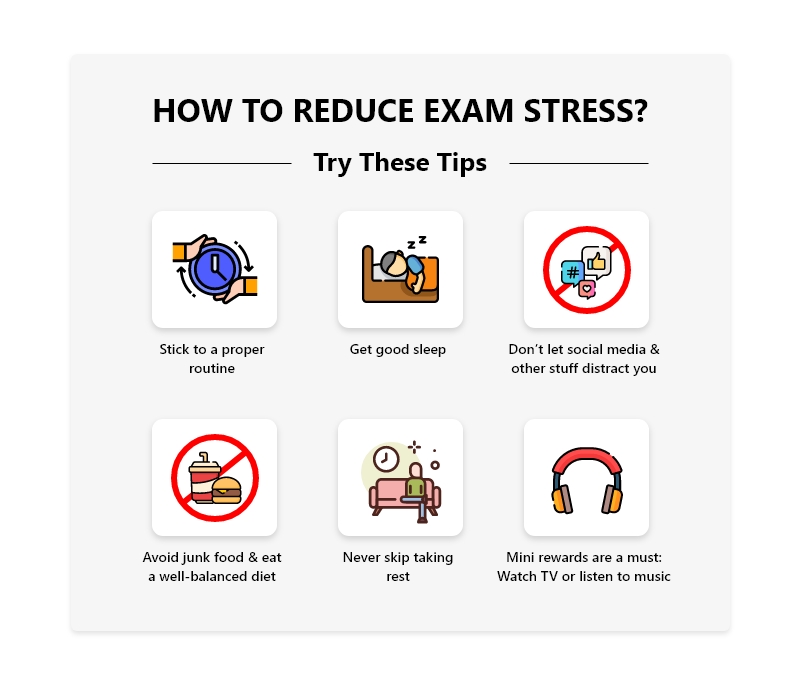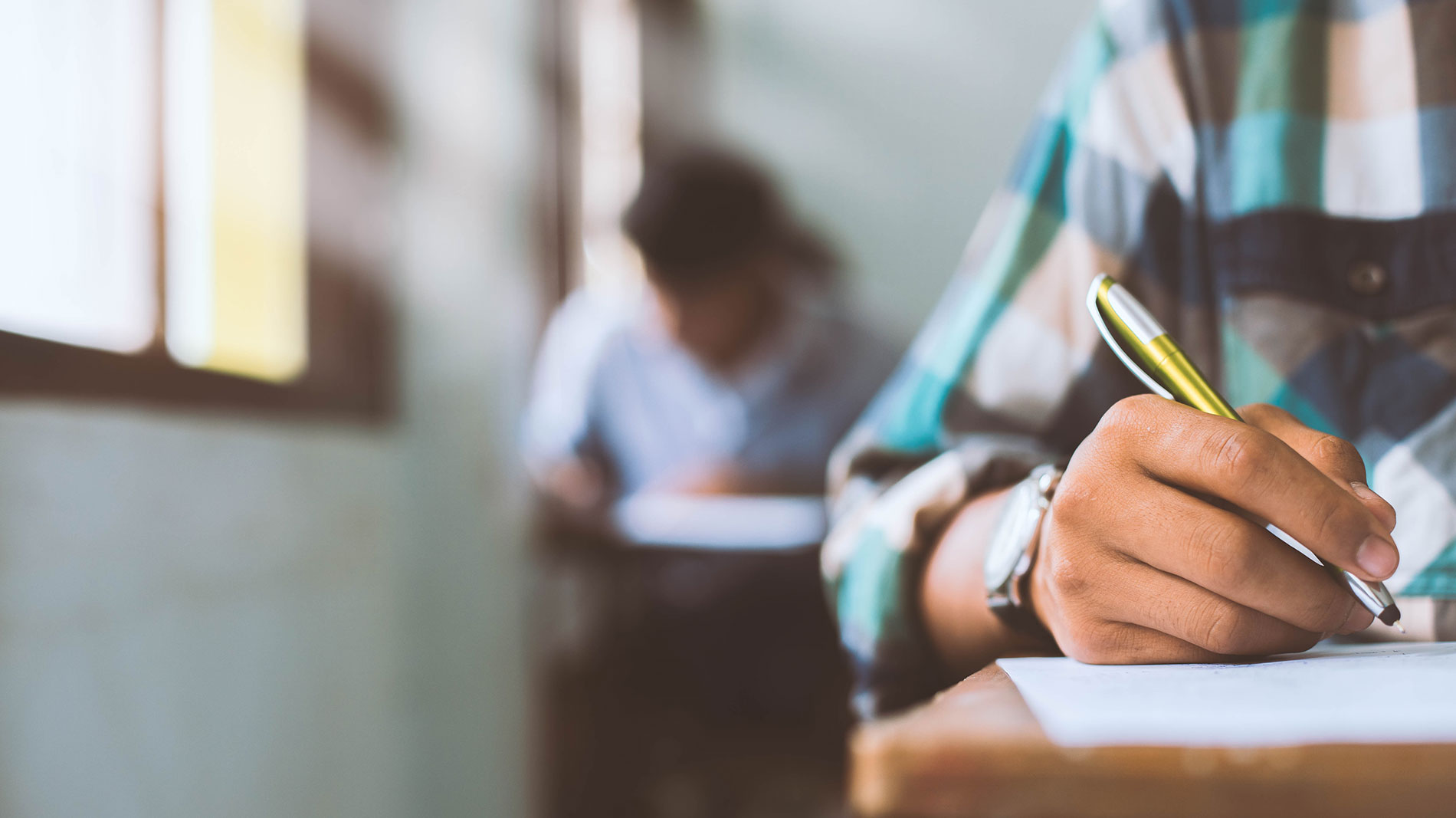How to reduce exam stress?
One of the most asked questions by students appearing for the board exams (Class 10 and 12).
Yes, you read it right!
Along with the exam tips and study tips, students ask for tips on how to reduce exam stress. They search for different ways to deal with exam anxiety and cope with it.
|
Did you know that every year, more than 1 crore students appear for class 10th and 12th board exams? While some students feel confident about the exams, some of them feel anxious and stressed. |
For those who feel less confident, stressed, and anxious before the exams, it is okay to feel that way. It is a big phase of your life, and feeling nervous before the board exam is natural. It happens with the majority of students.
So, if you are one of those students who is going through some major exam stress, all you need is proper guidance and support. You can talk to your parents, friends, relatives, or school alumni and ask for their advice.
Being in the education field and dealing with lakhs of students every year, Univariety understands the phases that students go through during the board exam season. Therefore, we spoke to some experienced counsellors across India and abroad to list down some tips and tricks on how to reduce exam stress.
Let’s dive into this article and follow those tips to eliminate the risk of burnout with exam stress.
Some Signs that You Are Stressed
“Help will always be given at Hogwarts to those who ask.” – Albus Dumbledore
Our favourite movie ‘Harry Potter and the Chamber of Secrets’ also teaches us that help is only given to those who ask for it.
This means no one will understand your problems and the issues you’re facing until you share them with somebody.
But the main question is how would you understand that you need help?
How would you realize that something’s wrong or missing or bothering you?
How would you know that you are stressed or anxious about the exams?
Here’s the answer.
These are some signs of stress and anxiety:
- Feeling confused and lost
- Unable to make decisions quickly
- Lack of motivation
- Finding it difficult to sleep
- Frequent headaches
- Upset stomach or feeling sick
- Fidgeting, nail-biting, teeth grinding, etc
Reasons Why You Are Feeling Stressed
If you feel one or more of the above-mentioned symptoms, maybe you’re thinking too much and putting too much pressure on yourself. There could be some other reasons also like:
- Worrying about failure
- Lack of preparation
- Lack of will to perform well in exams
- Finding it hard to study
- Family or peer pressure
- Unable to handle competing pressures and more
 Know-How to Reduce Exam Stress: Exams Tips
Know-How to Reduce Exam Stress: Exams Tips
They say every problem has a solution, just like how every lock is made with a key. All you need to do is find that key.
If you feel anxious or stressed while studying or preparing for exams, some activities can help you relieve stress.
Tips on how to reduce exam stress and make studying fun and interesting:
1. Keep your Study Place Neat & Clean:
You must have heard your mom say, keep your desk clean because a cluttered desk is a sign of a cluttered mind’.
Your mom is right as always.
Our mind gets too distracted when we see other stuff on the table we’re studying.
Clutter can create a lack of concentration. It overloads the brain and impairs the ability to think and leads to stress. That’s why keeping the study table clean is important.
Follow these points to be organized:
- Move the unnecessary stuff like pictures, snacks, etc out of your sight,
- Use drawers and store the unnecessary items there,
- Organize your desk with important items only,
- Once you’re done for the day, take 5 minutes and clean your desk for the next day.
2. Improve your Exam Time Management:
It is said, that students who know the time management techniques feel less anxious.
The right time management method helps in avoiding feeling overwhelmed, or stressed, and makes you feel more energized & focused. It includes proper rest, enough sleep, and sufficient time to complete your assignments also. You should:
- Take short breaks during the study hours, it makes you more productive.
- Try to complete the assignments in advance so that you have time to re-check them.
- Start blocking out dates and times for particular assignments on the calendar. Treat it as a fixed appointment.
A Bonus Tip: If you don’t want to lose any opportunity to learn and want to stand out in the crowd, utilizing your summer vacation is one of the best ways.
3. Read Something Interesting to Refresh your Mind:
It’s proven that reading something interesting reduces stress by up to 60%. It benefits physical and mental health by slowing down the heartbeat and relieving muscle tension.
When you feel it’s time to take a break from the syllabus, pick up an interesting book and read it for 20-30 minutes to continue your studies with more energy.
4. Cut Out Caffeine:
We know, that cutting down on caffeine is next to impossible for some folks. It’s hard to stay awake without our best friend ‘coffee’ and memorize that 300-page textbook.
|
Did you know? Caffeine is a drug, and like any other drug, it can have harmful effects when ingested in high amounts. |
Caffeine is a stimulant and increases your stress level despite decreasing it. Consume less caffeine to increase your concentration and relax your mind.
5. Reduce your Sugar Intake:
|
Did you know that sugar weakens your ability to deal with stress and that’s why anxiety loves sugar? |
When you are stressed your body releases more cortisol, a hormone that manages stress and blood sugar level. So, if you consume more sugar, the chances of feeling stressed may increase.
Your body sets the blood sugar clock based on your breakfast. So,
- Never skip breakfast.
- Try to avoid eating sugar in the morning.
- Eat eggs, peanut butter, oats, or nuts for breakfast.
6. Take a Break from Social Media:
The Internet was first invented for military purposes and then expanded to the means of communication among people. Now it is used for multiple purposes apart from just being a path to conversate.
But advantages come at a cost. Here, the cost is the lack of concentration and focus.
Checking Instagram and Facebook feeds is the first thing that the majority of people do nowadays. However, spending too much time on social media causes distraction and you’ll not be able to study properly. The blink of Instagram notifications can divert your focus.
Put your phone on aeroplane mode, or switch it off while studying. You can also try out some fun apps like Forest, Moment, Offtime, etc designed to help students ignore using social media and focus on studies.
7. Get enough sleep:
Stress and sleep are closely linked. Stress adversely lowers sleep quality and duration, while insufficient sleep can cause stress. It can even lead to sleep deprivation or sleep disorders.
Taking proper sleep and rest refreshes the brain and helps to be more focused. Doctors also recommend teenagers to take at least 8-10 hours of sleep within 24 hours.
Practice these tips to get a night of good sleep:
- Make a schedule for your sleep patterns that organizes and optimizes your sleep schedule.
- Switch off every device 1 hour before going to sleep.
- Try to read a book or listen to some soothing music.
Grandma’s Tip: Take a bath or at least wash your face & legs before going to bed. It relaxes your brain & body and helps you to fall asleep faster.
8. Exercise Regularly:
A fit body means a fit mind.
You will be thinking that how is it possible to take enough time to exercise while preparing for exams. But do you know regular exercise keeps you fit, motivated and focused?
We are not asking you to devote all your time and start training for a marathon. But it’s important to get moving.
Check out some suggestions:
- You can jog, go biking, or even go for a walk, 5 to 6 times a week for about 30 minutes.
- Set small goals for yourself. Do not push yourself too much.
- Make exercising fun. Listen to music while working out or try dancing.
- Remember, eating nutritious & healthy food is necessary.
9. Prioritise your Time & Make a Revision Timetable:
Break your revision down into small chunks. Form a plan so that you won’t have to think much at the start of the day about what to work on.
Making a revision routine and writing to-do lists each day will keep you on track. It will boost your confidence and make you super ready for the exams.
10. Put your Worries Aside & Be Kind to Yourself:
Don’t be too harsh on yourself. You are doing the best you can. You’re following your plan, sticking to it, and studying accordingly. You’ll get the best.
Celebrate your efforts and always look for a bigger picture. You can:
- List your achievements.
- Some goals that you have completed.
- Your awards, your rewards.
It will help in believing in yourself and push to do even brighter things.
Tips by Career Counsellors to Deal with Exam Stress
There are some common questions that students ask to reduce exam stress. We listed down some of those questions and asked some of the most renowned career counsellors to answer.
Let’s see some tips on how to reduce exam stress given by one of the most experienced career counsellors.
Question No.1 – How much do students sleep to maintain their concentration?

We asked this question to Ms. Pamela Ray Pawar, a certified Global Career Counsellor and the founder of The LearnEd Academy, Mumbai.
She answered the question very beautifully by giving the example of one of her students.
In her words, “My student Anushka mentioned during her coaching session with me that everyone teases me about the ease with which I sleep! And it used to embarrass me!
But on further reflection, she shared that ‘I’ve noticed that sleep allows me to get grounded and funnel my thoughts. Hence I end up being more productive. Studies seem less of a burden and I can tackle even my weaker subjects well’.
The American Academy of Sleep Medicine has recommended regular sleep for children aged 6-12 of 9–12 hours per 24 hours and teenagers aged 13–18 years should sleep 8–10 hours per 24 hours.
It’s proven that sleep can help the students to:
– Excel in school by maximizing attention, memory, and learning abilities
– Perform better in sports by being faster, stronger, and more accurate
– ‘Feel’ good and more optimistic
– Look their best and maintain healthy parameters
– Have the enthusiasm to enjoy life and have fun
Another important point I ask students to make, in today’s context is, not to take school/ college lessons sitting on the bed. Let the bed you sleep on be correlated to a place of sleep and not work. Then the mind can concentrate and differentiate between the two. This can ensure good sleep hours at night. Hence leading to better concentration through the day”.
Question No.2 – How should students revise before the examination?

Who else can give a satisfactory answer other than Ms. Palak Behl? She is a certified Global Career Counsellor and the Recruitment Advisor at King’s College London.
In her words,
- “Most importantly, start with a calm and relaxed state of mind.
- Always have a crunched version of the notes with just main headings and a 1-2 line summary. For example, flashcards are a great revision tool.
- Avoid picking up a completely new topic during revision just before the exams.
- Create a structured plan that works best for you. It could be chapter-wise or topic-wise as per your convenience.
- Do a more detailed revision two or three days before the exam and a more crunched version or a quick-glance version a day before the exam.
- Start your day early so that you have enough hours in the day to revise.
- Switch off distractions like social media.
- Take adequate breaks and refresh yourself.
- Sit in a good posture and in a calm place with a proper lighting system (studying in bed inside a quilt is not a great idea) to keep you attentive.
- Practice diagrams to write effective answers.
- Practically solve equations and sums for practice”.
Question No. 3 – What should students do if their mind goes blank during the exams?

We asked this question to Ms. Nahida Coelho, Founder & CEO of DiscoverU, Mumbai, and also a certified Global Career Counsellor.
In her words, “Breathe in Breathe out, is something I learned to consciously do much later in my life when I go blank. Today, I work with students who go through this fear which is rooted in anxiety (the anxiety and pressure to perform and excel). I recommend moving forward and responding to questions that might seem familiar.
Once you get into the flow of writing or thinking about what to write, the mind tends to ease up and begins to connect the dots. While you do this, you need to keep breathing. If you notice that you go blank often during your exams you need to be conscious about this and spend some quiet time before your exam commences to gather your thoughts”.
Question No. 4 – How to reduce exam stress?

We asked a certified Global Career Counsellor, Ms Bhavyata Bendre, who is the Director, of Right Track Consultants, Qatar to answer this.
In her words “I firmly believe that life skills are proscriptive and not prescriptive. Imagine a person having a heart attack, being asked to walk and eat well then! They are habits to keep your heart healthy. Similarly, students cannot be asked to beat stress in the heat of their exams. It has to be inculcated as a habit throughout the year so that stress is automatically reduced during exams.
A common strategy is the 80:20 rule for exam preparation. Having taught at university, one thing that I often suggest to my students is that 20% of the most important concepts in a subject account for 80% of the questions in the exam. It is smarter to prepare them well first. The remaining 20% of the questions can be attempted by reading the chapters well since they are likely to be short answers or MCQs. Preparing this way keeps the students confident while taking their exams”.
Question No. 5 – How should students deal with the disappointment & convince their family if the result is not good?

One of the greatest fears for a student is what if I am not good enough? How would I handle my family? How would I handle my relatives?
Ritu Wason, Founder & CEO at Educrossroads Consulting, Mumbai specializes in Student Profile Building along with being a certified Global Career Counsellor.
She answered this question beautifully, in her words, “Undoubtedly, exam results are an important factor in ensuring admission into a good university. But it is not the only criterion. It is not the end of your dreams and aspirations. Like Overseas universities, Indian Universities are also now opening up to considering holistic profiles for admissions which include academic performance, entrance exam or SAT scores, community projects, social work, sports and other extracurricular activities, dramatics, debates, MUNs, internships, work experience and self-driven initiatives in areas of one’s interests. Unfortunately, we, as parents put a lot of emphasis on exams and marks, especially in board classes, which leave children under tremendous pressure. Students who are not able to get the desired academic proficiency can look at other avenues to build and demonstrate other facets of their holistic personality.
Every child has different capabilities, interests, and talents. There are endless opportunities for students to study further and make careers. They can be successful in career streams aligned to their interests and aptitude. Parents and counsellors can work together on identifying these interests & skills and then match them to the relevant careers children can pursue in the future. This collaboration will enable students to be happy and successful in their work”.
Final Words
By following the above-mentioned tips, by the time you reach your exam, you’ll be a pro. You’ll feel no stress and will appear for the exams with confidence.
Also, passing board exams is only a part of the story, there are always other paths to reach your goals. You’ll have to just believe in yourself.
For more exam tips, study tips, and tips on how to reduce exam stress, Reach out to our expert career counsellors.
Parul is an enthusiast writer, currently working at Univariety. Despite being from a technical educational background, she started her career in writing because of her passion. She loves sketching and doodling while enjoying a cup of black coffee. When she is not writing, she likes watching movies, travelling, and exploring new places.



2 Comments
Reduce the exam stress is very important thing in now a days this is the very useful information thanks for sharing with us
Thank you for this related information